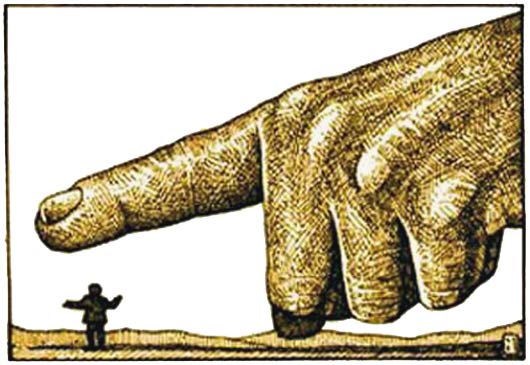
What is to be made of those who feel compelled to invoke biblical verses even when attempting to justify decidedly unbiblical notions?
Like Reform or Conservative (or "Open Orthodox") clergy who cite the Divine declaration in Genesis that "it is not good for man to be alone" as somehow overriding Leviticus' unequivocal forbiddance of "a man having relations with a male as with a woman."
Or, in the latest iteration of absurdity, the claim that the Torah "offers a highly elastic view of gender," the contention of Reform Rabbi Mark Sameth in a recent New York Times op-ed titled "Is G0D Transgender?"
G0D, of course, is neither male nor female, at least in the words' simplest senses, as He (the Divine neuter pronoun) is not physical. So one might indeed say that G0D transcends gender.
The op-ed writer, though, contends that various Torah verses indicate human gender's malleability, seizing on things like the fairly common alternate spelling of the Hebrew word for "she" with the letter vav, which could (but doesn't) allow the word to be pronounced as a masculine pronoun. The deficiencies of that attempt, and his other ones, to demonstrate the Torah's embrace of transgender rights -- the idea that people should feel free to ignore the testimonies of their bodies and choose whatever sex they feel -- are manifest to anyone familiar with biblical grammar and the Jewish religious tradition.
To be sure, two Midrashic sages (Vayikra Rabbah 12:2) assert that the first human was originally either androgynous or a double creation, a man and woman joined at their backs. And it is undeniable that both men and women contain multitudes, including both masculine and feminine characteristics. But to vault from that truism to the conclusion that Judaism holds that "gender is not . . . a matter of 'either/or'," as Rabbi Sameth does, is a leap too far by far.
The Torah is unequivocal about the fact that being born in a male body requires living the life of a man, and that being born female entails living as a woman. (Indeterminate biological sex, a rare but real occurrence, is dealt with at length in the Talmud.) Each gender has its particular life-role to play. For most of us, that doesn't present any great trial. For some, though, it apparently does. What that means, from a truly Jewish perspective, is that such people are privileged to have a supplementary challenge to overcome in their lives, in addition to the myriad more mundane trials faced by us all.
Taking on the life of a different sex than one's body indicates is, in the Torah's view, as futile as an average-height and portly fellow (like me) imagining himself as a 7'4" point guard and insisting on being accepted by the NBA. The bodies G0D gave us are indications of what we are and what we are not.
In fact, the notion that we have some right to ignore our biology is a rejection of the most essential idea of the Jewish faith. For Judaism is not about our wishes but our responsibilities; not about our comfort but our service. Attaining the "happiness and harmony" Rabbi Sameth sees as resulting from "choosing" one's sex comes from accepting Divine will, not seeking to subvert it.
Judaism isn't about trying to stretch the Torah's fabric to suit our personal longings but rather about bending our longings to fulfill G0D's will. Such self-denial, admittedly, is an unpopular notion these "liberated" days, but Judaism has been stubbornly countercultural since Sinai. It rejected the idolatries that dominated the world then; it stood resolutely against the societal evils that informed Greek, Roman and subsequent cultures no less; and it does not yield, either, to contemporary mores.
It is clear that there are people who are deeply conflicted about their gender identities. We must feel nothing but compassion for them. They face challenges the rest of us don't. And a sensitive, knowledgeable rabbi, rebbetzin or other spiritual mentor can help those so challenged to manage their dysmorphias and make their way through their lives.
But encouraging such individuals to reject the roles consonant with their bodies is, from a Jewish perspective, wrong. And invoking spurious "sources" from the Torah to do so is, to borrow from Isaac Asimov, wronger than wrong.
Rabbi Avi Shafran is a columnist for Hamodia: The Daily Newspaper of Torah Jewry. He has been a contributor to JWR since its inception in 1997.
Comment by clicking here.



 Contact The Editor
Contact The Editor
 Articles By This Author
Articles By This Author